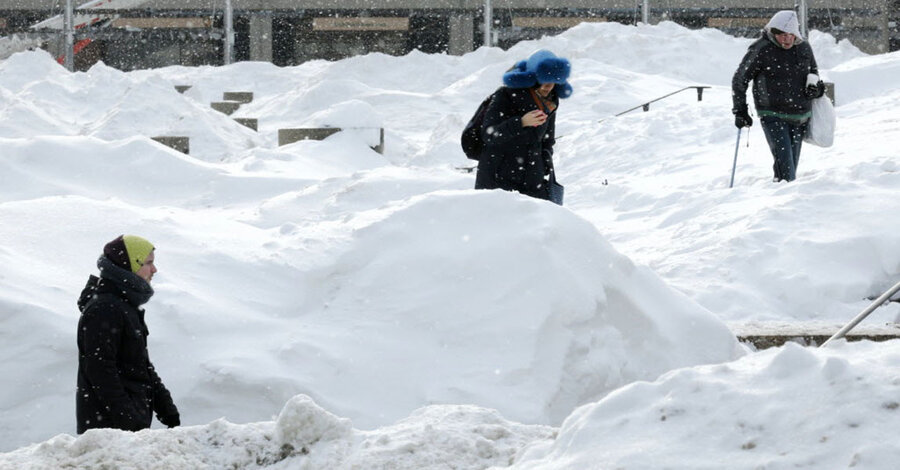Boston’s solid deal on its snow farm
Loading...
Here in Boston, as we dig out from record winter storms, we’re learning about a new form of agriculture: the snow farm.
As you’ve perhaps heard, we’ve had more snow in the past 30 days than ever before since recordkeeping began. This, in a city founded in 1630, is saying something.
The question on everyone’s lips is, “Where are they going to put it?” And the answer, to the extent that there is one, is “the snow farm.”
It’s a new term, but one everyone understands on first hearing. And a little Googling turned up one specific answer to what and where “the snow farm” is. At this writing 6 Tide Street in South Boston is the largest snow farm for the City of Boston.
On the map, it appears to be not far from the centers of power: the Federal Reserve Bank, City Hall. But the video clips make it look like a vast whiteness apart from everything.
Its natural soundtrack, to judge from most of the clips, is the relentless rumble of huge trucks, arriving, dumping, retreating, and repeating.
But the City of Boston has released a more highly produced video, featuring a city worker identified as Kevin the Snow Farmer. Talking over an elegiac piano score in his distinctive Boston accent (he evidently studied with the same speech coach as the “Car Talk” guys), he explains his own cycle of paving the streets in the summer and plowing in the winter. Hurray, local hero!
Boston, clearly, is very grateful to have 6 Tide Street. But is it really a farm?
Agriculture comes from words meaning “cultivation of a field.” Agri is a form of the Latin ager, which made it into English as our word acre.
But farm is not rooted in food production.
The Online Etymology Dictionary, following the Oxford English Dictionary, explains that farm came into English around 1300 to mean a “fixed payment (usually in exchange for taxes collected, etc.).” The word came from the Old French ferme, meaning a rent or lease.
The online dictionary adds that the sense of “tract of leased land” is first recorded in the early 14th century but that of “cultivated land, leased or not,” didn’t emerge until 200 years later.
“The purely agricultural sense is comparatively modern,” according to another dictionary.
The idea behind the French word that became our English farm is that of something steady, stable, enduring, or fixed: something “firm,” in other words. Both the adjective and the noun firm (a business) come from these same French and Latin roots.
So farming was originally all about having a solid business arrangement. Only later did it come to mean coaxing growing things from the earth.
This may be just as well in the case of snow farms. Most of the time, the crop is what is harvested from the field. But in this curious form of agriculture, the crop gets delivered to the field.







